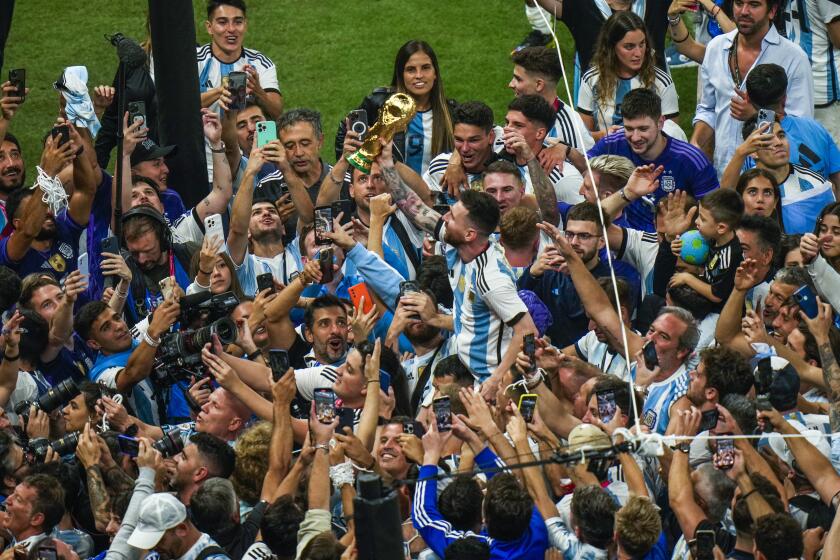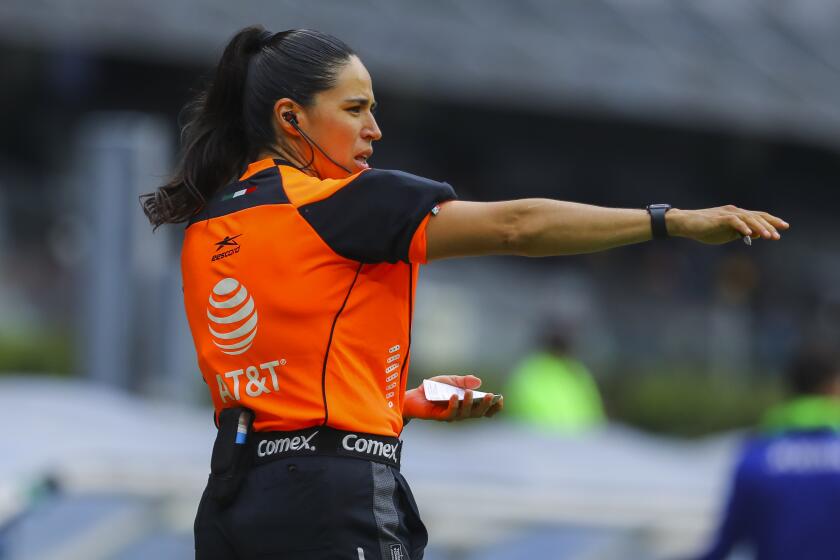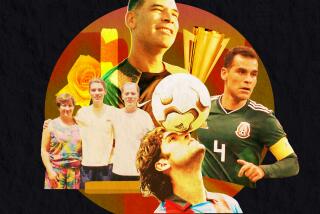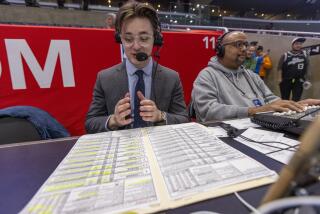
The narration unspooled in an uncommonly prescient way, as if the man behind the Telemundo microphone knew exactly how the play would unfold.
“Here it comes, here it comes, here it comes,“ Andrés Cantor tells his audience in Spanish.
It isn’t until the ball goes into the net that he unleashes the call that has made him one of the most popular — and parodied — announcers in U.S. sports history.
“Gooooooooooooooooooolllllllll!!!!,” he screams, a lung-clearing bellow that can last 20 seconds or more and, after a pause for breath, will be repeated by another that lasts even longer.
Even if you’ve never heard Cantor’s name, you’ve heard his voice — if not on Telemundo or his Fútbol de Primera radio network, where he calls more than 120 games a year, then in commercials for Geico, Volkswagen and Pepsi, on an episode of “The Simpsons,” or in the 2014 Disney feature “Muppets Most Wanted.”
But while the call has become his calling card, it doesn’t define a career that has reaped six sports and regional Emmys, a spot in the National Soccer Hall of Fame and a trip to his 12th World Cup this month in Qatar — his 10th as a journalist.
“The goal call has made him so famous, I guess it’s a good headliner,” said his son Nico, a soccer commentator for Paramount+ and the CBS Sports Network who will work alongside his father in Qatar. “But at the end of the day, my dad is a brilliant analyst.
“He knows the game so well, he anticipates so many things. It’s not just a goal call.”
For the first time, the FIFA World Cup is heading to the Middle East for a fall showcase. Here is The Times’ complete coverage of the 2022 Qatar World Cup.
That knowledge and anticipation is the result of a lifetime of playing, watching and reporting about the game. In California, that started at San Marino High School, where he was sports editor of the school paper and a standout midfielder on the soccer team.
“So I played,” Cantor said, “and I wrote the stories about the game.”
He was also a budding entrepreneur. Shortly after moving from Buenos Aires to Southern California as a teen in the late 1970s — his father David was a clinical professor of medicine at USC and later president of the medical staff at Huntington Memorial Hospital in Pasadena; his mother was a psychologist — Cantor would frequent a newsstand that sold a variety of newspapers and magazines from his native Argentina.
He later borrowed $10,000 from his father to buy out the distributor and began making twice-weekly trips to Los Angeles International Airport to pick up the magazines, which he sold from south Orange County to the San Fernando Valley. Within months he had paid his father back in full.
Cantor really didn’t want to sell newspapers and magazines, though; he wanted to write for them. He was 6 when his father took him to his first soccer match, and by the time he turned 11, he knew what he wanted to write about.
At 16, he landed a job as a soccer correspondent for Editorial Atlántida, an Argentine publishing company, and three years later he went to the 1982 World Cup in Spain as an intern. Four years after that, he was a fully credentialed World Cup journalist.
But it was while covering a boxing match in Las Vegas that his career shifted. Cantor was struggling to file a story under unrelenting deadline pressure when he looked up to see a pair of TV announcers signing off and heading for the casino.
“I said, ‘I think I like that,’” Cantor remembered.
So he auditioned for the fledgling Spanish-language Univision network by narrating a game, using for the first time the goal call he would soon make famous.
“I guess I did it because it just came natural to me,” Cantor said. “Every other play-by-play announcer I’d heard before did it.”
For the first time, women officials will work the men’s World Cup. Karen Díaz Medina of Mexico and Kathryn Nesbitt of the U.S. are two of the six women chosen.
On a chilly fall afternoon, Cantor slides onto a stool in an otherwise empty Pasadena hotel lobby just a few miles from the Rose Bowl, where he used to watch his high school football team play — and where he later called his first World Cup final in person, rather than off a monitor.
Dressed in a gray short-sleeve polo shirt and jeans, he has just flown in from South Florida, which partially explains what he’s carrying: In one hand he holds a thermos of hot water and in the other he cradles what looks like a miniature witch’s caldron stuffed with lawn clippings.
It’s actually a caffeine-rich herbal tea called yerba mate, which Cantor, 59, drinks in part to soothe his throat and ease the punishment his vocal cords endure calling several soccer games a week. It’s not the only concession he makes to a grueling schedule that hasn’t eased much in his 3 1/2 decades in broadcasting. When he’s at home in Coral Gables, he works out with a personal trainer, whom he also consults daily when he’s traveling, a regimen that helped him shed 45 pounds.
“It is really, really demanding,” he said of the workload.
Nor is the yerba mate the only cultural touchstone from Argentina that Cantor has held on to. The goal call is another. Cantor says he first heard it as a boy in Buenos Aires listening to José Muñoz narrate Boca Juniors games on the radio.
“Radio was the medium that everyone listened to. And we all listened to him,” Cantor said. “He had 90% of the audience. The goal call, I guess it was embedded in the way I grew up.”
Muñoz’s call was flatter, duller and shorter than Cantor’s, which varies depending on the game and the score. A goal call late in a one-sided friendly is far less dramatic than the narration of a game-winning score in a World Cup game. Cantor said excitement — and a lack of breath — nearly caused him to pass out describing Landon Donovan’s stoppage-time goal in the 2010 World Cup, arguably the most famous score in U.S. men’s soccer history.

“It’s not really the question of breathing,” he said. “It’s depending on the flow of the play that precedes the goal. Sometimes you have so much emotion in big games, and you’re out of breath. I was exhausted. I had nothing left in the tank.”
And though he uses the goal call when working in English, it feels much fuller, more heartfelt in Spanish.
“You know, in Spanish we feel the game,” he said. And the goal call isn’t something he goes out of his way to do. “It’s not a gimmick. It is a word that pretty much sums up the passion for the game.”
Alexi Lalas, who was named to two U.S. World Cup teams before becoming a TV analyst for ESPN, NBC and Fox Sports, agreed.
“You don’t have to understand Spanish to have it translate. And I think that’s what makes him great,” Lalas, who will be the studio host of Fox Sports’ coverage in Qatar, said of Cantor. “You can feel the energy and you can feel the passion.”
Lalas got to experience that first-hand when he was paired with Cantor for NBC’s English-language coverage of the 2000 Olympics.
“We knew why he was there. If and when goals came, my job was to lay out and let him earn his money,” Lalas said. “I could go for a coffee and a cigarette and come back and have him still going.”
But Lalas also came away from the experience appreciating Cantor for more than just the theatrics.
“The man is a legend for a reason, and it’s not just the goal call,” he said. “Within that call it encapsulates the spirit and the emotion of the game of soccer.”
On the Viaducto, a six-lane freeway running east-west through the capital, traffic is nearly at a standstill and one lane in each direction is stopped completely.
The goal call, in fact, is just a small part of what has made Cantor a legend — a designation the almost painfully humble broadcaster would reject.
His narration has a rhythm and a confidence that, when you’re listening to him on the radio, allows you see what you’re hearing. Part of that comes from being lucky enough to have grown up in Southern California at a time when Hall of Fame sports broadcasters filled the radio dial.
“I grew up listening to Chick Hearn,” Cantor says of the Lakers’ late radio and TV voice. “I loved his style. I admired, obviously, Vin Scully. He was a poet on air. He wasn’t just a play-by-play voice.”
But the other key to Cantor’s success is hard work. More than three decades after calling his first game, he still spends hours watching video and studying reports to prepare for a game.
“You have to do it that way. You can’t fly in and try to think you’re going to perform,” said Stu Holden, a former World Cup player who will be the lead analyst for Fox Sports in Qatar.
Holden found himself working many of the same games as Cantor at the 2018 World Cup in Russia and came away marveling not just at his encyclopedic knowledge, but also his longevity.
“[I] started to have a real deep appreciation for what he’s been able to do at such a high level for so many years,” he said. “When you’re in it together there is this mutual respect. And certainly, from my side, I can only hope that 20, 30 years from now I’m still doing this.”
Cantor’s passion and understanding of the game can be infectious, his son Nico said.
“It’s crazy to watch soccer with him,” he said. “Sometimes you take for granted that he’s your dad. But you’re picking the brain of a brilliant mind, a guy who has seen so much in the sport.”
Andrés Cantor said he never pushed his children into broadcasting, fulfilling a promise he made to himself as a young man after his physician father made it clear he wanted his son to practice medicine too. Yet Nico, after accompanying his father to games as a boy and feeling the connection he had for the sport, said he never considered another career. His younger sister Andrea also went into TV as a freelance producer.
But while their father is best known for his work in Spanish, his children, who speak multiple languages, are making their careers primarily in English.
The elder Cantor, who became a U.S. citizen in 1992, didn’t have the opportunity to start his career in English — at least not if he wanted to call soccer games. When Cantor made his debut, Major League Soccer was still a decade away, and the U.S. hadn’t played in a World Cup in 37 years.
“The language of soccer is universal,” said Cantor, who has spent the last 22 years with Telemundo. “But when I was given the chance to work for Univision, I don’t think there were any American outlets carrying soccer. In 1987, ABC carried maybe one game per year. Maybe.”
Since then, Cantor has called two Olympic tournaments in English for NBC as well as selected Premier League games, working mainly from Telemundo’s $250-million production studio just west of Miami International Airport.
In Qatar, where four games will be played daily in an unusually tight 35-mile radius, Cantor will call two matches a day in Spanish for Telemundo and offer analysis on his radio network through the quarterfinals. He’s begun training with a voice coach, he said, to prepare for the strain, which will ease after the quarterfinals, when there will be no more than a game a day.
The daily workouts with a personal trainer and the sessions with a voice coach are acknowledgments that Cantor is closer to the end of his career than the beginning. He hopes to do at least one more World Cup because the 2026 tournament will include games in Southern California, bringing his career back to where it started.
He said he has no firm plans beyond that. Perhaps he’ll let Nico represent the family in the press box above the pitch, or maybe he’ll find he still has more to say. What’s certain is when Cantor does sign off for the last time, he will leave the sport much better than how he found it.
An afterthought when he took up broadcasting, soccer is now the fastest-growing sport in the U.S., and ratings are rising for both English and Spanish telecasts. Cantor isn’t solely responsible for that, of course, but he did his part.
“There was a whole generation of soccer broadcasters that have been influenced by him, even in English,” Lalas said. “And while nobody does it the same way that he does, people have taken his approach and have tweaked it for whatever culture or language they have.
“So ultimately I think his biggest legacy has been his influence on multiple generations of voices that called the game in many, many languages.”
More to Read
The complete guide to home viewing
Get Screen Gab for everything about the TV shows and streaming movies everyone’s talking about.
You may occasionally receive promotional content from the Los Angeles Times.










